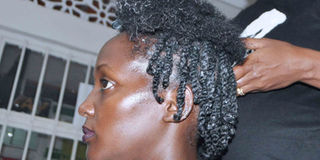Kinky Roots: Natural hair affair turned business

Kinky Roots founder Esther Nasssali works on a customer in her salon. The salon specializes in natural hair. Photos by Eronie Kamukama
African hair can be described in many ways. But one sure way is that it is kinky. If you are born in the 1990s, you will notice that it is only recently that there has been a glaring transformation as women are abandoning chemicals for the natural kinky look. As more women go natural and spend thousands of shillings on their new look, there are innovative people who are not missing out on the trend.
Every enterprising person has their own story and Esther Nassali‘s business came from solving a personal problem. The book publisher spent 10 years chemically straightening her hair and it was not until 2017 that she let her straight hair fall off. The challenge was finding a salon that would allow her successfully transition to a natural look.
“It was very painful and frustrating. Most salons I went to were trying to achieve the straight hair look,” she recalls.
As she tried to find answers to grooming her natural African hair, she decided she wanted to build her own brand. It took learning first.
“I read about natural hair online. I watched videos. I joined a Facebook group called Natural Hair Uganda where people share experiences. So I set up the salon to help people who were as lost as I was. I had the interest in helping people embrace their kinky hair. I wanted them to know it is fine for your hair to be hard and not straight because that is what the world standard dictates,” Ms Nassali says.
The outcome is Kinky Roots, a natural hair salon that specialises in styling African hair using locally sourced organic products, Uganda’s Shea butter as the main oil.
Located in Bugolobi, one of Kampala’s residential areas, Kinky roots today gets 95 per cent of its customers through social media advertising, generating between Shs300,000 and Shs500,000 in profits every week. In the salon, the language is different. You hear more of detangling, halo braids, coils, twists and never about hair retouching.
How she started
Unlike many businesses built from scratch, Ms Nassali chose another way when she started out three and a half months ago.
“I bought a salon that was up for sale because the setting was what I wanted. But it also meant that I would start quickly,” she says.
At Shs15m, the salon was handed to her. Little did she know that she was about to be tested by the trials of running a business not many Ugandans are familiar with.
“Buying an existing business comes off as easy. But it is not. For instance, this salon was formally working on chemically straightened hair, so changing mindsets is hard. We have no chemicals, it is purely organic here. So it was challenging when I was sourcing workers, they wondered how we were to send away people with straight hair and whether we would make money,” Ms Nassali explains.
Plus, every other day, she would realise something needs to be fixed to offer customers a good experience. The Shs15m went higher as she formalised the business and trained workers.
“It (the figure) almost doubled. I could not find workers who understood natural hair so I had to do training,” she says.
Natural hair trend
She cites the natural hair trend as a “thing from the Western world” and often questions within the female circles are asked about the sustainability of salons birthed out of the trend.
“I strongly believe natural hair customers are going to increase because mothers are cutting off straight hair and raising children with natural hair,” she says.
“In some salons, people line up to dress their hair, if they realise they can get the same service closer to home, we shall have more customers,” the optimistic Nassali says.
Expansion plan
Cutting it as a natural hairdresser seems risky but the 32-year old envisages growth. She is to set up branches in areas that lack natural hair salons to give customers accessibility. She envisages growth in profits to Shs500,000 every day, for now.
But this growth, she says, depends on putting the customer at the centre of the business.
Of course the business needs the money.
But Ms Nassali says it cares more about customers’ hair needs because it is happy when its services are working for them.




